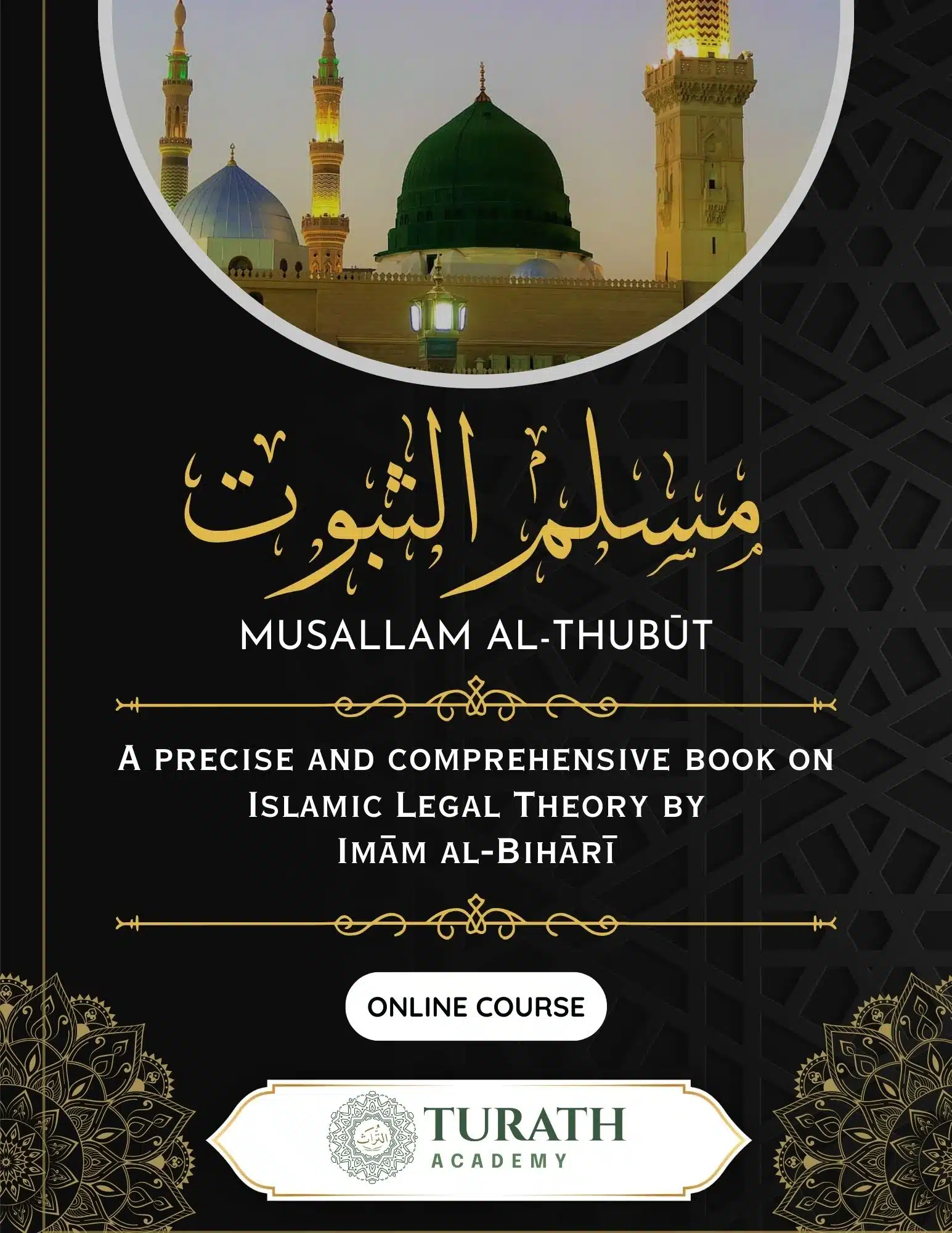About Course
This course offers an advanced study of the initial chapters from Muḥibbullāh al-Bihārī's works, blending the methodologies of Islamic jurists (Ṭarīqah al-Fuqahāʾ) and theologians (Ṭarīqah al-Mutaqallimīn). It is designed for graduates with a solid grounding in Uṣūl al-Fiqh, aiming to deepen their understanding of Islamic legal theory. Students are expected to have a thorough knowledge of foundational texts and principles to tackle the complex content effectively. The curriculum challenges students intellectually, enhances analytical skills, and prepares them for scholarly or professional roles in Islamic jurisprudence through rigorous study and critical engagement with intricate legal theories and texts.
Course Focus
- 1. Unified Approach: The work itself serves as a quintessential example of this unified methodology, reflecting al-Bihārī's mastery of rational sciences and his profound understanding of the intricate interplay between different strands of Islamic thought. By weaving together the insights of all strands of jurisprudence, he creates a comprehensive framework that enriches the study of legal theory.
- 2. Detailed Study: Throughout the course, we will present a meticulous examination of the beginning chapters from al-Bihārī's compilation. Each chapter will be analyzed in detail, allowing students to appreciate the depth of his arguments and the clarity of his thought. This focused study will illuminate key concepts and principles, fostering a deeper understanding of the foundational elements of Islamic legal theory.
- 3. Critical Engagement: Students will be encouraged to engage critically with the material, drawing connections between the theoretical frameworks presented and contemporary issues in legal discourse. This analytical approach will empower them to reflect on the relevance of these classical teachings in today’s context.
- Invitation to Explore
- Through this immersive exploration, participants will not only enhance their grasp of legal theory but also cultivate a deeper appreciation for the intellectual heritage of Islamic scholarship. By studying the synthesis offered by al-Bihārī, students will be equipped to navigate the complexities of Islamic jurisprudence, inspiring them to contribute thoughtfully to ongoing discussions in the field. This course is an invaluable opportunity for those seeking to bridge the gap between traditional scholarship and contemporary legal challenges.
About the author
- Muḥibbullāh al-Bihārī (d. 1707) was a prominent Islamic scholar and jurist, renowned for his profound contributions to the field of Uṣūl al-Fiqh (foundations of Islamic jurisprudence). Born in the late 17th century in India, he hailed from the city of Bihār, which played a significant role in his intellectual development.
- Al-Bihārī is best known for his synthesis of the two major methodologies in Islamic legal theory—Ṭarīqah al-Fuqahāʾ (the path of the jurists) and Ṭarīqah al-Mutaqallimīn (the path of the theologians). His seminal work embodies this unified approach, showcasing his mastery of rational sciences and his ability to bridge the gap between different strands of Islamic thought.
- His scholarship not only addressed complex legal issues but also emphasized the importance of reason and rationality within the Islamic legal framework. Al-Bihārī's influence continues to resonate in contemporary discussions of Islamic jurisprudence, as his insights remain relevant for scholars and students alike.
- Through his dedicated pursuit of knowledge and his impactful writings, Muḥibbullāh al-Bihārī has left an indelible mark on the landscape of Islamic legal theory, inspiring future generations to explore and engage with the rich heritage of Islamic scholarship.
Course Curriculum
-
39:02
-
45:09
-
45:23
-
Musallam Al-Thubūt | Lesson 4
01:15:51 -
Musallam Al-Thubūt | Lesson 5
43:30 -
Musallam Al-Thubūt | Lesson 6
42:36 -
Musallam Al-Thubūt | Lesson 7
01:24:44 -
Musallam Al-Thubūt | Lesson 8
39:33 -
Musallam Al-Thubūt | Lesson 9
39:06 -
Musallam Al-Thubūt | Lesson 10
35:30 -
Musallam Al-Thubūt | Lesson 11
43:24 -
Musallam Al-Thubūt | Lesson 12
41:29 -
Musallam Al-Thubūt | Lesson 13
01:19:39 -
Musallam Al-Thubūt | Lesson 14
01:05:45 -
Musallam Al-Thubūt | Lesson 15
43:52 -
Musallam Al-Thubūt | Lesson 16
45:18 -
Musallam Al-Thubūt | Lesson 17
01:07:39 -
Musallam Al-Thubūt | Lesson 18
36:30 -
Musallam Al-Thubūt | Lesson 19
01:01:00 -
Musallam Al-Thubūt | Lesson 20
59:34 -
Musallam Al-Thubūt | Lesson 21
58:52 -
Musallam Al-Thubūt | Lesson 22
51:24 -
Musallam Al-Thubūt | Lesson 23
45:15 -
Musallam Al-Thubūt | Lesson 24
52:18 -
Musallam Al-Thubūt | Lesson 25
58:46 -
Musallam Al-Thubūt | Lesson 26
01:07:54 -
Musallam Al-Thubūt | Lesson 27
44:08 -
Musallam Al-Thubūt | Lesson 28
01:01:59 -
Musallam Al-Thubūt | Lesson 29
53:37 -
Musallam Al-Thubūt | Lesson 30
42:34 -
Musallam Al-Thubūt | Lesson 31
01:05:39 -
Musallam Al-Thubūt | Lesson 32
01:17:36 -
Musallam Al-Thubūt | Lesson 33
52:19 -
Musallam Al-Thubūt | Lesson 34
52:30 -
Musallam Al-Thubūt | Lesson 35
43:00 -
Musallam Al-Thubūt | Lesson 36
01:01:37 -
Musallam Al-Thubūt | Lesson 37
49:54 -
Musallam Al-Thubūt | Lesson 38
50:20 -
Musallam Al-Thubūt | Lesson 39
46:07 -
Musallam Al-Thubūt | Lesson 40
50:49 -
Musallam Al-Thubūt | Lesson 41
01:02:01 -
Musallam Al-Thubūt | Lesson 42
29:00 -
Musallam Al-Thubūt | Lesson 43
49:06 -
Musallam Al-Thubūt | Lesson 44
01:06:46 -
Musallam Al-Thubūt | Lesson 45
48:33 -
Musallam Al-Thubūt | Lesson 46
48:52 -
Musallam Al-Thubūt | Lesson 47
35:36 -
Musallam Al-Thubūt | Lesson 48
38:40
Student Ratings & Reviews

No Review Yet
$30.00 / month
-
LevelIntermediate
-
Last UpdatedOctober 17, 2024
Hi, Welcome back!



